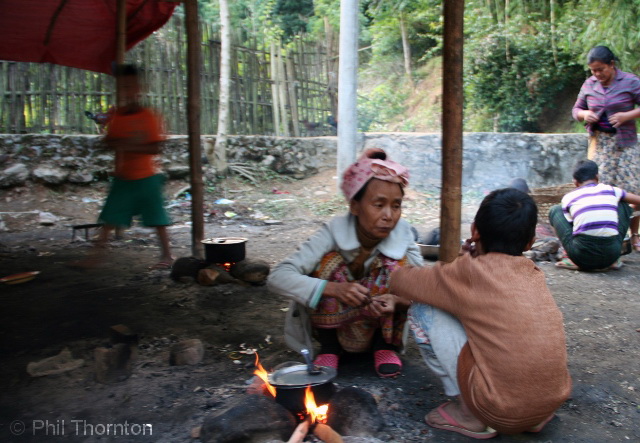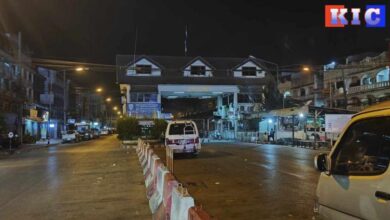Kachin IDP’s Are Tortured and Jail Sentence Increased

In what human rights groups are calling a blow to Burma’s ongoing reform process, two Kachin IDP’s arrested under Burma’s Unlawful Association Act law have had their jail sentence increased from two years to seven years – the reasons for the increase are as yet unclear. Burma Army units who arrested them last month are also alleged to have tortured the men after their arrest, including beating them and sexual abuse.
The two Kachin men, Brang Yung and Lahpai Gam, had their prison sentence increased from two to seven years on Thursday the 19th of December. They had been charged under Article 17/1 of the Unlawful Association Act. After more than a year in detention, they were sentenced to 2 years in November, and an additional five years were added to their sentence on 19th December.
The two men were farmers until they along with their families, had become internally displaced by fighting between Kachin Independence Army (KIA) forces and the government military that broke out in 2011 shattering a 17-year ceasefire.
In order to support themselves and their families, the two men requested permission from the supervisor at the displaced peoples camp to be allowed to work as herdsmen. In June 2012, while taking lunch they were taken by the Burma Army’s 37th battalion for questioning and breaking the Unlawful Association Act.
The two men were then alleged to have suffered torture and forced to make false confessions that they were connected with the KIA and had been involved in bombings in the area.
Family members said that during the Burma Army interrogations the men were beaten, burnt, pierced with needles, had to drink water mixed with fuel and forced to have sex with each other.
“By befriending the military-backed government, the international community is abandoning political prisoners, and ignoring their suffering. It is time for them to step up and put pressure on the government to solve the problem of political prisoners once and for all, “said Wai Hnin, Campaigns Officer at Burma Campaign UK, a British based human rights advocacy group focusing on Burma.
“It is now very clear that Thein Sein does not keep his promises and it is very foolish for the international community to trust his words rather than his actions,” Wai Hnin added.
Arrests Continue Under Burma’s Draconian Laws
The Unlawful Associations Act is not the only law to have been abused by the government, human rights groups say. Burma’s Peaceful Assembly and Peaceful Procession Law, first hailed as part of the country’s roadmap to democracy, has also been used to imprison and harass hundreds of political activists since it was first introduced under Thein Sein’s administration. The law gives government authorities power to ban any protest and the government can ban gatherings of two people or more.
On July 15, Burmese President Thein Sein committed to free all prisoners of conscience by the end of 2013, where in a London visit he met British PM David Cameron, and said, “I guarantee to you that by the end of this year, there will be no prisoners of conscience in Myanmar,” he said, “We are aiming for nothing less than a transition from half a century of military rule and authoritarianism to democracy.”
However, in a troubling development, farmers, activists and ethnic civilians have continued to be arrested, put on trial, and in many cases given prison time.
Just last month, two activists were fined 40,000 Kyat for participating in a peaceful protest in Yangon on the International Day of Peace last year. The activisits were made to attend 140 different court hearings over an almost two-year period, in what human rights advocacy group Burma Campaign UK described as tacticts to “suppress dissent and protest.”
In September, two staff members of the Human Rights Defenders and Promoters— U Aung Myint, age 44, and Hla Myo Naing, age 34—were arrested in Irrawaddy Region on September 5 and September 17, respectively, after providing awareness-raising trainings on human rights to local communities.
Other arrests since the President’s July statement also include, Naw Ohn Hla, 52, an activist sentenced on August 29 to two years hard labor for protesting a Chinese-led copper mine in Sagaing Region; U Kyaw Hla Aung, 74, a prominent Rohingya lawyer, human rights defender, and longtime humanitarian worker arbitrarily detained in Sittwe, Rakhine State on July 15; and ten Rakhine activists who were convicted for peacefully protesting a Chinese-led natural gas project and sentenced on September 26 to three months in prison.
The Assistance Association of Political Prisoners in Burma (AAPP) reported on its website last month that although 66 political prisoners were released in November, 30 activists were also arrested – several of who paid fines rather than face imprisonment. A large number of those imprisoned are farmers sentenced under Section 18 of The Peaceful Assembly Law and Section 505 (b) of The Penal Code.
The AAPP said that, “while the country looks to its future the practice of using arbitrary laws in curtailing its citizens’ civil and political liberties is still very much in place.”




